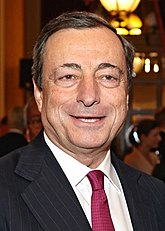President of the European Central Bank
| President of the European Central Bank | |
|---|---|

Emblem
|
|
| Member of | Eurogroup |
| Reports to | |
| Seat | Frankfurt, Germany |
| Appointer |
President of the European Commission By majority approval of the European Council. |
| Term length | Eight years, non-renewable |
| Inaugural holder | Wim Duisenberg |
| Formation | June 1, 1998 |
| Deputy | Vice President of the European Central Bank |
| Website | www.ecb.europa.eu |
The President of the European Central Bank is the head of the European Central Bank (ECB), the institution responsible for the management of the euro and monetary policy in the Eurozone of the European Union (EU).
The President heads the executive board, governing council and general council of the ECB. He is not elected by popular vote. He also represents the bank abroad, for example at the G20. The President is appointed by majority in the European Council, de facto by those who have adopted the euro, for an eight-year non-renewable term. However the first President, Duisenberg, did not serve his full term (see below)
Wim Duisenberg was the President of the European Monetary Institute (EMI) when it became the ECB, just prior to the launch of the euro, on 1 June 1998. Duisenberg then became the first President of the ECB.
The French interpretation of the agreement made with the installation of Wim Duisenberg as ECB President was that Duisenberg would resign after just four years of his eight-year term, and would be replaced by the Frenchman Jean-Claude Trichet. Duisenberg always strongly denied that such an agreement was made and stated in February 2002 that he would stay in office until his 68th birthday on 9 July 2003.
In the meanwhile Jean-Claude Trichet was not cleared of legal accusations before 1 June 2002, so he was not able to begin his term after Duisenberg's first four years. Even on 9 July 2003 Trichet was not cleared, and therefore Duisenberg remained in office until 1 November 2003. Duisenberg died on 31 July 2005.
Jean-Claude Trichet became President in 2003 and served during the European sovereign debt crisis. Trichet's strengths lay in keeping consensus and visible calm in the ECB. During his tenure, Trichet has had to fend off criticism from French President Nicolas Sarkozy who demanded a more growth-orientated policy at the ECB. Germany supported Trichet in demanding the bank's independence be respected.
...
Wikipedia

